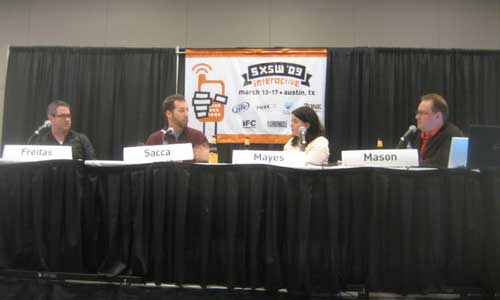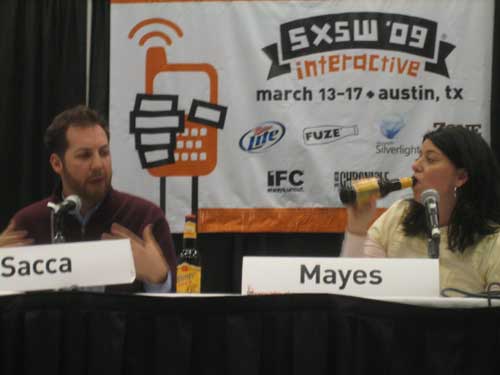Monday afternoon Bryan Mason Founder of Small Batch Inc, Ryan Freitas Director of Product Design for Plinky, Christopher Sacca Managing Director of Lowercase Capital and Laura Mayes Co-founder of Kirtsy discussed how to quit your job and do what you want to do.

Mason took the panelists through a short check list of what to do, how, and when to quit the day job for the start up.
1. Resign. For legal reasons, you must have a resignaiton letter. The panelists relayed stories of various inappropriate letters. They all warned that when you resign, you should be prepared to leave that day.
2. Have a copy of all your agreements. Do you own your inventions and what you have been working on? Invention, no poach, non- competitive, confidentiality, equity agreements…
Basically, the panelists warned to make sure you own your work before you quit to work on it.
3. Finish strong. Reference checks… “The last couple things you do are the things people remember,” said Mason. LinkedIn makes it easy to contact coworkers.
“You don’t want to burn bridges,” warned Freitas. “You cant put too much a of a premium on leaving everyone happy.”
Sacca shared a story about how he knew he was being fired in a few days and prepared a statement of empathy for the firing person.
“I think showing some empathy to the person who has to fire you is hugely important,” said Mason.
Mason asked Sacca, “how did you know when it was time to leave Google?”
“It was really tough,” he admitted. “I was letting everyone outside of me set the expectations for what I wanted to do… then I finally sat down and thought, ‘wait, this isn’t actually making me happy.'”
4. Getting Ready
Owning ideas, have enough money, how much planning?
“You can’t use anything that belongs to your employer”, said Sacca. Work in your garage, use your own equipment on your own time.
Make a plan.
At this point, a round of Shiner Bocks were passed out and Sacca began talking Mayes out of her day job.

Mayes said she still enjoyed her day job and wasn’t sure she was ready to leave.
They began discussing how to actually transition into quitting.
“People talk talk talk talk talk, but they don’t get anything done,” said Sacca. “Dont write the document, just wirte the code.”
They all agreed that it is important to create separation from the two jobs if you are doing both.
Mayes- “It’s hard not to slight one of the two.”
Freitas- said he has a smoked bacon business at the same time as “real” job. He said that having two unrelated jobs helps.
Sacca- change clothes.
Freitas- take some time for you.
Sacca- keep a healthy relationship with your inbox. Don’t allow it to become a task list that anyone else can add action items too.
When starting with other, Sacca admonished to discuss with all the starting partners, “Where do we want to end up?”
Mayes also pointed out that you need to define the goals. Will this be a networking thing or a monetizing thing?
Mason broached the subject of the legal aspects to quitting and starting your own idea. Mayes explained how right out of the gate they got hit with a law suit over the name and talked about how they found a lawyer and worked though that.
Sacca warned against thinking about that too much at the beginning.
“Upfront don’t distract yourself with those details,” he said.
The panel ended with a QA of slightly nervous non-identified audience members asking vague questions about hypothetical situations for “friends” answered by Sacca shoveling out advice and for the third time disclaiming that he can’t give legal advice.
